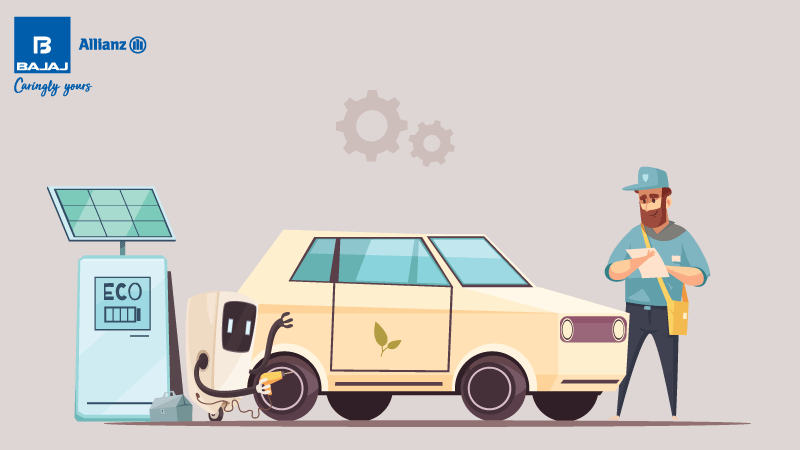As electric vehicles (EVs) become increasingly popular, more drivers are making the switch to cleaner and greener transportation. Owning an electric vehicle comes with its own set of maintenance considerations, distinct from traditional fuel-powered cars. To ensure optimal performance and longevity of your electric vehicle, it's essential to adopt a proactive approach to maintenance. Let’s we'll explore the top maintenance tips for new electric vehicle owners, helping you navigate the unique aspects of EV care.
Maintenance Tips For Your EV
The following tips will help in maximising the shelf of your EV while enhancing its performance at the same time:
Optimize Battery Health
The battery is a critical component of an electric vehicle, and maintaining its health is essential for sustained performance. To optimize your EV's battery health:
Avoid Extreme Temperatures
Extreme heat or cold can affect battery performance. Whenever possible, park your electric vehicle in a shaded area or a garage to protect it from direct sunlight or extreme cold. Any mishap in your absence may cause damage to the battery of the EV. For example, if you have an electric scooter, the cost of battery repairs or any other parts related to the mechanism may be covered with the help of
electric scooter insurance. If you happen to have a normal two-wheeler, ensure its safety along with your own by purchasing a suitable policy using the
bike insurance calculator.
Claims are subject to terms and conditions set forth under motor insurance policy.*
Use Preconditioning
Many electric vehicles offer preconditioning features allowing you to warm up or cool down the battery while the vehicle is still plugged in. This helps improve efficiency and range, especially in extreme weather conditions.
Limit DC Fast Charging
While fast charging is convenient for long trips, frequent use of DC fast charging can contribute to accelerated battery degradation. Use fast charging judiciously and rely on normal charging levels for everyday needs.
Rotate Tires Regularly
Tire maintenance is often overlooked but plays a crucial role in the overall performance and efficiency of any vehicle, including electric ones. Regular tire rotations help ensure even wear, extending the life of your tires and improving handling. Consult your vehicle's manual for recommended tire rotation intervals and patterns.
Electric vehicles, with their instant torque, can sometimes put more strain on tires during acceleration. Therefore, keeping an eye on tire tread depth and rotating tires according to the manufacturer's recommendations can contribute to a smoother and safer driving experience.
The benefits of tire rotation can significantly reduce the risk of accidents. In any unfortunate instance, having
electric vehicle insurance might help in covering the cost of repair that may arise due to an accident.
Claims are subject to terms and conditions set forth under motor insurance policy.*
Brake System Maintenance
Electric vehicles commonly use regenerative braking systems that harness energy during deceleration to recharge the battery. This technology can result in less wear on traditional braking components like brake pads, but it's still important to inspect and maintain the brake system regularly.
Ensure your brake fluid is at the recommended level and that there are no leaks. While EVs often experience reduced brake wear, it's advisable to follow the manufacturer's recommendations for brake inspections to address any potential issues early on.
Maintain Cooling Systems
Electric vehicles rely on cooling systems to regulate the temperature of crucial components, including the battery and electric motor. It's essential to monitor and maintain these cooling systems to ensure optimal performance and prevent overheating.
Check coolant levels regularly and schedule routine maintenance for the cooling system according to the manufacturer's recommendations. If your electric vehicle has a liquid-cooled battery, ensuring the cooling system is functioning properly is particularly important for preserving the battery's health.
Plan for Battery Replacement Costs
While electric vehicle batteries are designed to last for a substantial number of kilometres, they will eventually degrade over time. It's wise to plan for the eventual replacement of the battery, understanding that this is a significant maintenance cost associated with electric vehicles. While advancements in battery technology may continue to drive down costs to some extent, it might be beneficial for you to familiarize yourself with the terms of your vehicle's warranty and plan for battery replacement costs in the long-term ownership of your electric vehicle. If you own an electric car, be sure to check if your
electric car insurance offers any type of coverage for battery replacement.*
Conclusion
Owning an electric vehicle brings with it the responsibility of adopting specific maintenance practices to ensure optimal performance and longevity. By following these top maintenance tips for new electric vehicle owners, you can navigate the unique considerations associated with EV care. Proactive maintenance is key to enjoying the benefits of cleaner and more sustainable transportation.
*Standard T&C Apply
Insurance is the subject matter of solicitation. For more details on benefits, exclusions, limitations, terms, and conditions, please read the sales brochure/policy wording carefully before concluding a sale.
 Service Chat: +91 75072 45858
Service Chat: +91 75072 45858


